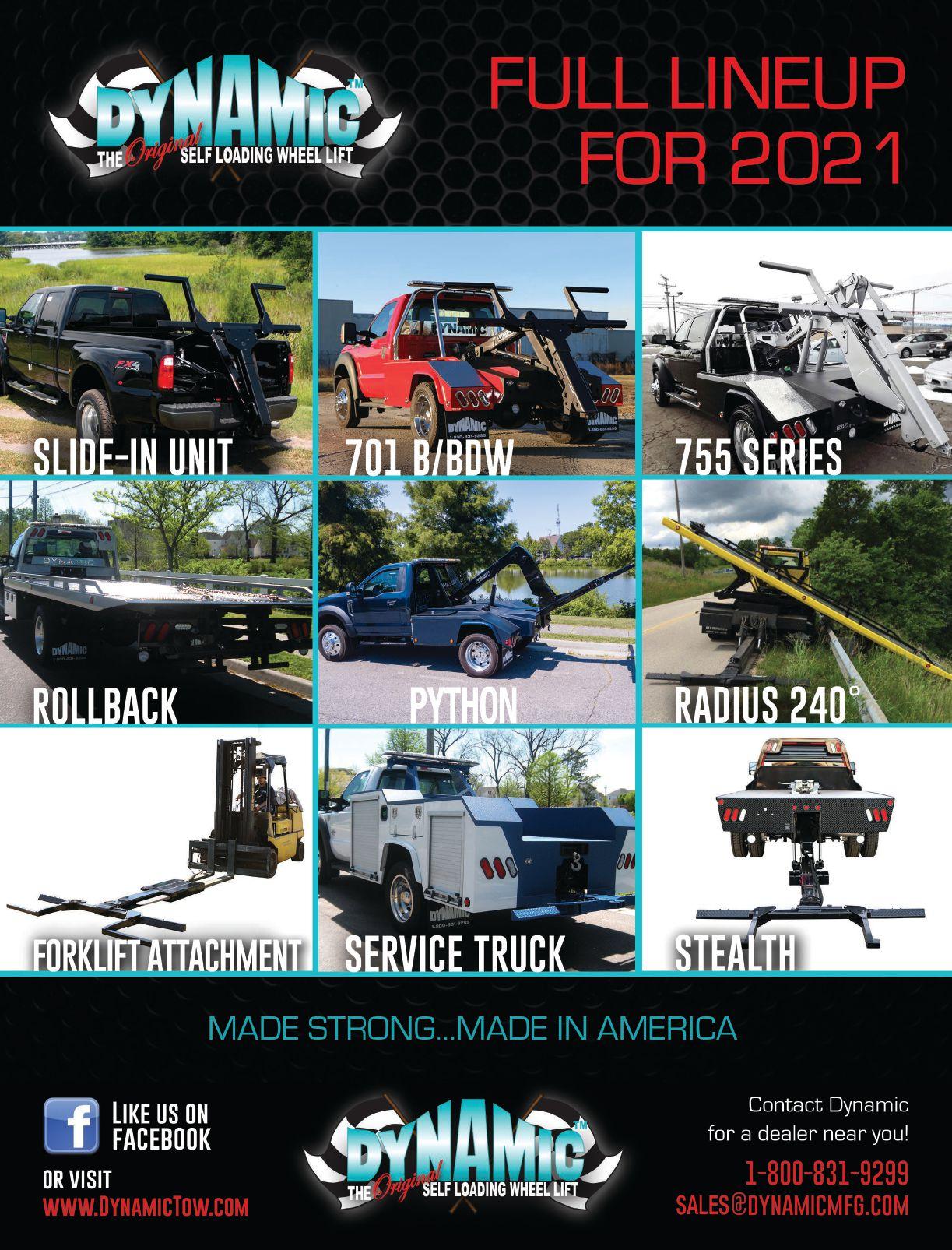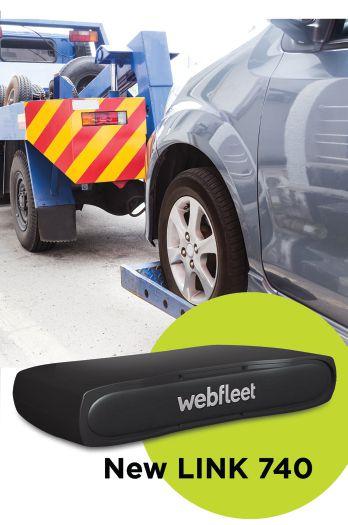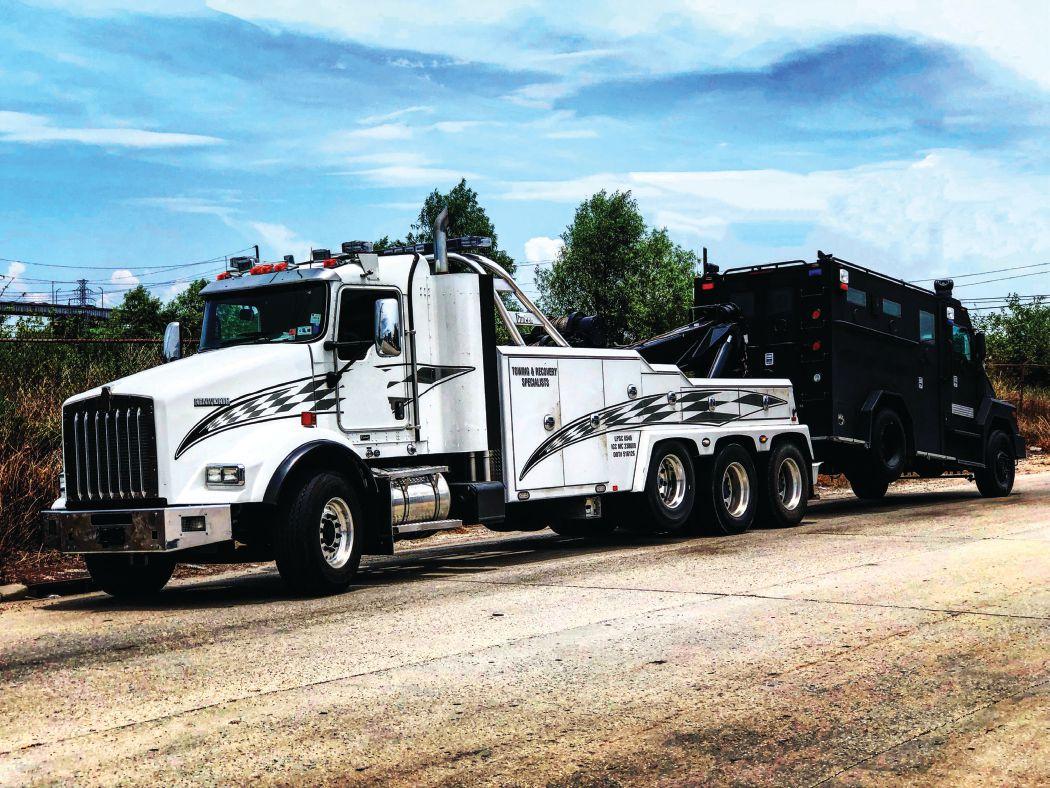
10 minute read
Tow Boy
We have been hearing for years that the global towing and roadside assistance market is undergoing a transformation to the digital age.
As a towing professional that has been in the towing industry for nearly a decade, I am here to share that the transformation continues, with a mobile solution that focuses on customer service excellence. The solution is a self-service mobile application similar to Uber or Amazon with direct contact between the customer and the towing professional with no third-party intervention. This new solution is currently in development and planned for release in the summer of 2021.
“Tow Boy - Service providers are taking back the towing industry”
Customers will be able to:
• Select from a menu of services. • Take pictures of their vehicle to share with the service provider. • Select from drivers in their immediate area to expedite service. • Track the driver in real-time throughout the completion of the job.
Service providers will:
• Be certified prior to being added to the application. • Dedicated to providing excellent service while
“Active” in the application. • Receive a reasonable rate for services (not sharing a large percentage of the rate with a third-party provider).
JOIN THE NETWORK THAT POWERS LEADING BRANDS
SIGN UP at geturgently.com/towpro or CALL US at 888.871.6447

HIRING & FIRING

tactics that might just get you sued
Times have changed, so have people. Hiring and firing used to be simple and straightforward.
Lawyers now advertise on television, the internet, and the radio – in fact, during just about every television program you watch, they drop eight or ten lawyer commercials per hour. While most are mainly covering slips and falls or car accidents, more and more firms are getting into employment law. This is one of those areas where I can’t recommend enough to get up to snuff on the rules of engagement and learn how to avoid penalties.
Unlike dealing with a vehicle damage claim, having to handle a wrongful termination suit, or worse yet, constructive discharge claim is often more detrimental to your business. First, employment claims generally aren’t covered by any form of insurance like a truck wreck or vehicle damage claim may be – these come straight out of your pocket. And with margins as tight as they are, especially now with shutdowns and drops in business levels, writing that $50,000 or $100,000 check is just something most people can’t afford to do.
That money could very well be all the extra money you have for the year, after you pay everyone,
pay yourself, reinvest in trucks and equipment, and pay all the other bills like fuel and insurance. You finally have some cash sitting on hand, and something one of your employees does to another employee might cost you significantly. I’ll get to that in a moment.
Before we get started, let’s establish something – a damage claim, wrecking one of your trucks, or even a wrongful termination suit are pretty much cut-and-dried scenarios. A constructive discharge claim, which I’ll fully explain, isn’t cut-and-dried at all. It can name you separately from your business as a “separate civil litigant.” It can also name one or more of your employees, especially managers and dispatchers, as separate civil litigants. You can’t protect them. You can pay their attorney’s fees, but there’s no protection for them, or you, under your LLC or incorporation.
A safe and legal hiring process is all about documentation. Don’t make promises you can’t keep, and if you make any promises, be sure to drop them into an initial employment agreement and get signatures with your countersignatures.
The hiring area where most employers fail or come up short is over-promising and under-delivering. If you tell someone they’re going to make $75,000 per year in an interview, and you know in your own mind that it would take 40+ hours per week of overtime, three big truck wrecks per week, and to have all the planets in alignment to get that done – you probably shouldn’t make the statement. Many, many employers get all giddy and excited about hiring a well-qualified and experienced person and they tend to let their mouth overload their backsides…and it bites them in the butt.
The best-case scenario that happens after you make promises you can’t keep is that you have an angry employee who feels like you lied to them – and of course, they start looking for another job once they figure it out. They might even talk to other employees who may also make the realization that you stretched the truth. I’ve actually seen five people out of an eight-person crew quit in one week because of that.
That’s a bad scenario in and of itself with losing half or more of your crew. What’s worse is a constructive discharge suit brought on by those mile-high promises you made and couldn’t deliver on.
Terminations are a whole different animal. In an “at-will employment” state, you don’t generally need to document every little mistake made by an employee before terminating them, but it surely helps. It also helps to go over those details before you drop the hammer, so to speak.
It IS NOT generally a wrongful termination if you don’t tell someone why you’re letting them go. That myth is just that – a myth.
Treat them with respect, make sure you can get all of your property back, from keys, to phones, to gate codes and other things. Cover yourself and use a witness during the entire termination process – not just that last five minutes. And then write an after-action report with your witness helping, just in case the terminated person wants to litigate, or threaten litigation.
When it comes to threatening litigation, having worked closely with attorneys for twenty years, I can tell you that no one who ever threatened litigation has ever followed through. Most people who say they’re going to sue you don’t know an attorney, have never met an attorney, and have no idea what the basis for a lawsuit
New Tow Tracking Device

Future-proof truck tracking and fleet management for any type of vehicle.
Let’s drive business. Further.
For more information:
webfleet.com/towing
Call: 205-728-9135 timothy.smith@webfleet.com
with merit would even be. You should still cover yourself, regardless of how serious you may take them.
One bit of advice I can give that will likely save you time, headaches, and drama is that if an employee or former employee – or even a customer – threatens to sue you, stop the conversation immediately, tell them politely that you can no longer speak to them, and that if they’ll have their attorney send you a formal contact request, you’ll forward it to your attorney.
Don’t let your ego or your will to argue get in the way – the other person is angry and is grasping at straws. Shut them down and don’t say or do anything that might compromise your business.
Now – there’s the one suit that an employer can’t blow off, and the scenarios involved in one of these have likely happened in your business several times. Yes, you’ve probably done these things. Maybe we all have.
One guy is annoying, doesn’t do a great job, and other employees complain about him. So, you refuse raises or promotions, and you give him all the crap jobs you can think of. Sweeping, mopping, stocking items in the shop, doing extra dirty jobs…making him work weird shifts, cancelling days off…all in an effort

TM

20 YEARS OF SERVING THE TOWING & ROADSIDE INDUSTRY
Thank You for Being the Best Part of Our 20-Year Journey
125M+ Calls Dispatched
2M+
Calls Automatically Billed to Motor Clubs 2M Job Updates Processed Daily
1.2M Man-Hours Saved Annually
1M Email Invoices Sent Through Dispatch Anywhere in Last 12 Months 10K+ Mobile App Users
600K+ Vehicles Processed Through TowLien 250K+ Vehicles Currently Impounded


to get him to quit on his own so you don’t have to fire him.
How about making promises you can’t deliver on, or treating someone with less respect than others? Or one I’ve witnessed recently, outright lying to the employee, and then making him work menial tasks when he is highly qualified and has a great background and reputation, but the ego of one or more of your managers won’t let him work to his potential so he can make decent money.
These are all examples of constructive discharge, and it’s actually very much illegal. It’s like in the trucking industry where a truck driver whines and cries about miles and money, and the dispatcher gets tired of hearing it so they hold back good runs from the driver and make sure he only gets about half of what everyone else does for miles and income…and the driver quits. That’s constructive discharge, and it’s illegal.
He hasn’t been fired – he quits because he wasn’t treated fairly or with respect, or you as an employer created a scenario that caused him to realize things weren’t working out in his favor.
Remember that “separate civil litigant” statement? In a constructive discharge suit, whoever made things happen that impacted the employee can and will be named in a suit separately from your company. That person will then have to defend himself. How many of your dispatchers or managers can drop $2,500 – $10,000 to pay an attorney to defend them, especially when what they’ve done likely can’t be defended? Are you planning to cover those costs for them? After all, you as a manager or owner let whatever happened happen.
The official, legal definition of constructive discharge is when an employee resigns because they can no longer stay on the job due to a hostile work environment. This differs from a typical resignation, firing, or other types of separation of employment as the employee is leaving because of intolerable working conditions.
Unbearable working conditions might include discrimination or harassment, mistreatment, or receiving a negative change in pay or job duties for reasons that aren’t workrelated.
In a constructive discharge scenario, the law treats it like a wrongful termination, only the normal elements like harassment or discrimination based on age, national origin, pregnancy, race, religion, sex/ gender, and disability don’t apply – this is all about the environment you’ve allowed to be created for the employee.
One last thing. Most states have statutes surrounding wrongful termination – if a person were discriminated against, there are limitations provided to actually protect the employer – awards to a plaintiff are generally limited to their wages for a year, times two or three, perhaps. With a constructive discharge, especially in a jury trial, emotions and feelings come into play and the jury essentially gets to write the check. Not a situation you want to be in. The sky is the limit.
Protect yourselves and your employees – if a manager or dispatcher is playing favorites or treating someone like a red-headed stepchild, acknowledge it, especially to the person getting favors or being treated badly, and step in and stop it.
It’s all about your bottom line and your reputation. Imagine for a minute what a constructive discharge suit could do to your future employment efforts. These, like all suits, become public at some point, plus people talk. Especially wrecker drivers!
Integrates with every major towing software
Our latest integration, HAAS Alert, protects your drivers and help save lives.
Let’s drive business. Further.
For more information:
webfleet.com/towing
Call: 205-728-9135 timothy.smith@webfleet.com










